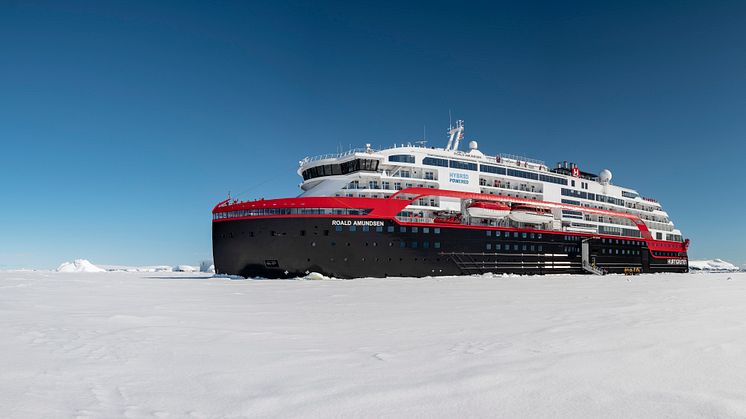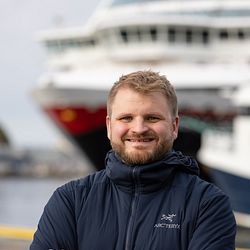
Pressemelding -
Hurtigruten prepares for further growth – establishes separate expedition cruise entity
Hurtigruten reports strong demand for 2021 and 2022 cruises. Preparing for post-Covid-19 expansion, the company announces it will redefine its growing cruise operations by establishing a separate expedition cruise entity.
As the rest of the global travel industry, Hurtigruten is currently experiencing the challenges of the global Covid-19 pandemic.
- 2020 is a tough year for everyone in the travel industry. But the set back is only temporary. For second half of 2021 and beyond, we are seeing a strong demand across all markets and all destinations, including the Norwegian coast, the Arctic and Antarctica, Skjeldam says.
- The demand reflects our predictions that expedition cruises, with all our advantages such as smaller ships, more flexibility and fewer guests, will prove even more popular post-COVID-19, Skjeldam says.
.
Small ships – big demand

Hurtigruten Group CEO Daniel Skjeldam. Photo: Hurtigruten / Rune Kongsro
.
Hurtigruten Group CEO Daniel Skjeldam oversees Hurtigruten’s 15 ship operation that has grown significantly over the past years, both in number of ships, guests and destinations – including some of the most spectacular destinations on our planet.
Hurtigruten recently launched selected 2022/2023 voyages – including Antarctica and the Arctic – and reports a strong global demand.
- We have only seen the beginning of what’s to come. Hurtigruten see great demand and equally great opportunities in the expedition cruise segment from 2021 and beyond. This is the growth we are preparing for, Skjeldam says.
Hurtigruten is announcing that the global travel group is preparing for further growth, reorganizing their cruise operations in two different entities: Hurtigruten Expeditions and Hurtigruten Norway.
.
Hurtigruten Expeditions
 MS Spitsbergen exploring Svalbard. Photo: Stefan Dall/Hurtigruten
MS Spitsbergen exploring Svalbard. Photo: Stefan Dall/Hurtigruten
Hurtigruten’s expedition cruises includes more than 250 destinations from pole to pole, ranging from the Northwest Passage, Greenland, Norway, Svalbard, British Isles to Caribbean, South America and Antarctica.
As Hurtigruten consolidates the position as the world’s largest expedition cruise line, Asta Lassesen is appointed CEO of Hurtigruten’s global expedition cruise operations.
- As Hurtigruten continue to grow our expedition cruise offering, we will keep doing what we do best: Combining almost 130 years of exploration with cutting-edge innovation and our unparalleled commitment to sustainability to deliver unique experiences in some of the world’s most awe-inspiring destinations, Lassesen says.

HURTIGRUTEN EXPEDITIONS CEO: Asta Lassesen. Photo: Rune Kongsro/Hurtigruten
Hurtigruten’s expedition cruise entity will operate a fleet of 8 small size, custom built and greener expedition cruise ships. Starting in 2021, Hurtigruten is offering several new itineraries – including new year-round departures from United Kingdom and Germany, as well as a full Alaska season.
- We go where the big ships can’t, taking you far beyond the ordinary and closer to communities and nature, while exploring the true beauty of our planet in a more sustainable way, Lassesen says.
.
Hurtigruten Norway
 Photo: ULF SVENSSON/Hurtigruten
Photo: ULF SVENSSON/Hurtigruten
Operating the Norwegian coast continuously since 1893, Hurtigruten has longer and more in-depth experience on the spectacular Norwegian coastline than any other cruise line.
Hurtigruten’s iconic 2500 nautical mile between Bergen in the south to Kirkenes at the Russian border offers a unique combination of local travelers, goods and cruise guests, visiting and serving 34 communities along the rugged Norwegian coastline.
From 2021, Hurtigruten’s coastal operation will consist of 7 custom built ships, and operate under a separate entity with a yet to be named CEO.
- The Norwegian coast is our home. No one knows Norway like Hurtigruten, and from northern lights, the midnight sun, wildlife and local communities, there is no better way to experience authentic Norway than with Hurtigruten. We’ve pioneered the Norwegian coast for more than a century. But the best is yet to come, Skjeldam says.


